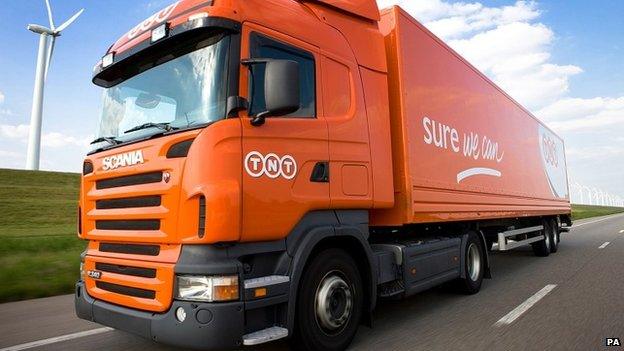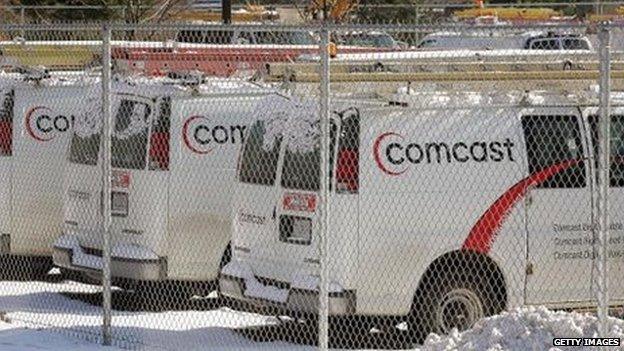The year of mega deals?
- Published

After only the first quarter, this year is shaping up to beat last year's frenzied deal-making.
Years of low interest rates and cheap borrowing costs, record high stock markets, and a recovery that is finally picking up steam combined to mark 2014 as the busiest year for mergers and acquisitions (M&A) since the recession.
This year's pace is even faster as consumer spending has picked up over the past year.
The latest is a €4.4bn (£3.2bn) deal announced between US company FedEx and Dutch firm TNT, which would propel it into one of the three largest parcel delivery services in Europe, rivalling DHL and UPS if approved.
Strikingly, the €8 per share offered in cash by FedEx is 33% higher than TNT's share price. FedEx is aiming for a foothold into Europe through this acquisition and believes it can turn around struggling TNT.
Like last year when 10 of the 15 largest acquisitions were US-based companies, the FedEx deal reflects the cash-rich balance sheets of American multinationals after years of rising stock markets.
According to Thompson Reuters data, global M&A activity rose 47% from 2013 to reach $3.5 trillion last year.
They were driven by large deals like FedEx's. There were 95 valued at $5bn or more in 2014 and several mega deals, such as Comcast's $70.67bn deal with Time Warner Cable. This year, there's the Heinz Kraft $40bn mega-merger, which I have written about before.
Last month also saw AbbVie's $21bn deal to buy Pharmacyclics. M&A transactions in the biotech and pharma sector have already reached $59bn in 2015, which is a 94% increase over the same period a year ago.
Towers Watson and Cass Business School found that the first quarter of 2015 was the busiest for M&A since at least 2008, with 41 large deals worth more than $1bn - an all-time high for the first three months of the year.
The deals are happening largely in the US, Europe as well as Asia, so the reach is global. M&A activity rose by 51% in the US and by 55% in Europe.

Comcast's purchase of Time Warner Cable was one of 2014's mega deals
Cash-rich
KPMG surveyed, external 735 M&A professionals from American companies, private equity firms and investment banks, and found that 79% had made one acquisition in 2014 while 82% planned to make at least one deal in 2015.
Some 40% of respondents said that large cash reserves were the main driver of their M&A activity. The Federal Reserve says that there is a record amount of cash sitting on US corporate balance sheets, of some $2.05tn.
When cash sits idle - when there's more than is needed for financing operations - there'll be questions over whether that money could be put to better use, say through investment and creating jobs.
High US corporate tax rates are thought to have contributed to American companies parking money overseas.
And that's caught the attention of President Obama, whose 2015-16 budget aims to raise $238bn from an one-off 14% tax on about $2tn in earnings stashed overseas by American multinational companies and will use that money for infrastructure investment.
Surely that move will help spur more cash deals. So, coming back to 2015 being another record year for M&A, the most active sectors are healthcare, tech/media, and consumer goods.
FedEx's latest acquisition reflects the growth of both the tech and the consumer goods markets. As bricks and mortar shops struggle against the rise of e-commerce, there'll be more goods ordered online to be delivered to homes.
In the UK alone, Barclays estimates , externalthat products ordered online in 2013 generated more than one billion deliveries, and this number is forecast to grow by nearly 30% by 2018.
Even so, the entry of Amazon and the failure of CityLink show that the parcel delivery market is a highly competitive one.
Doing deals in the first part of the year may be even more important as companies aim to take advantage of record low borrowing costs before US interest rates are expected to rise, likely later this year.
This is why 2015 is being viewed as another strong year for M&A. Seeing cash being put to work will be welcome, but it will also mean greater uncertainty for jobs as M&A usually means restructuring operations.
So, it looks like we'll be seeing more of these billion dollar deal headlines for a while.